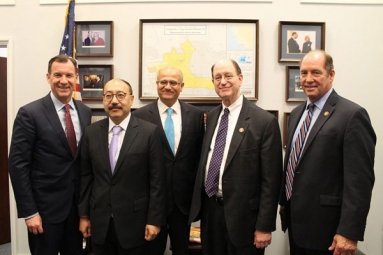
(Image source from: Common lies job seekers tell for employment })
Employees are the most important assets of an organisation. So companies should be careful before hiring a person into their workforce. Present day offices are technology-driven and giving access to company information, confidential or non confidential, to an incompetent person may cost dearly to the organisation.
The person may not intensionally harm the organisation. But as an employee the person has the potential to negatively affect an organisation's performance, work culture and image. A company may end up paying up to five times the salary of that individual, in case a wrong person is hired.
Recruiters need to be wary of job seekers who exaggerate and fib on their resume. Here are some common lies told by job seekers.
Extending job experience
Job seekers extend the duration of employment in previous company(s) to increase their chances of landing a job. While it's ok to adjust a few days, there are some candidates who fill in long gaps by showing the phase as being employed with a company. Such enhanced tenure of experience gives a false picture of the candidate. The job seeker may not be as efficient as required by the company.
Recruiters can run a reference check on the applicants to find out the truth.
Employment with a ghost company
Some candidates show fake employment with a non-existential company as being their past employers. This is usually done to fill gaps in work history. Such job seekers usually say that the company has closed down or is owned by a friend or relative. Candidates hide the truth about their job sabbatical as they feel that their competence will be doubted by the employer. Besides, gap in employment also reduces the candidate's negotiating power when it comes to his/her salary .
Altered job title
Job seekers often alter the job title on their CV to get promotion from their new recruiter. Such altered job title also has the desirable benifit of an inflated salary. This is a common practice from job seekers.
Recruiters must be cautious about such candidates as they assume a higher role and authority, for which they may not have the desired skill and experience. Based on their CV credential the company will entrust a big task, which may go wrong and leading to loss of business and client.
Exaggerated salary package
Potential job seekers inflate their last pay package to boost their bargaining position. A company may not reveal the pay package of its previous employee due to confidentiality issues. This is exploited by some sneaky job seeker to get undue raise in their salaries. Such practices are unethical and must be stopped.
Hiding criminal records
The chances of getting hired reduces for applicants with a criminal record, no matter how trivial her/his crime was. So it is normal that candidates conceal such information from a potential employer. But in this age of technology nothing can be hidden completely. Past information about a potential employee can be easily dug up. A person’s name and date of birth is enough to get past informations. A candidate’s past can also be revealed from social networking sites like Facebook and Twitter.
Recruiters can run a criminal background check to find out about such candidates.
Showing false qualification
Companies advertise vacancies along with the job requirement - degree, experience and technical skill - that all applicants must have. In order to be eligible, job seekers show false qualification on their CV by generating forged degree certificates or even produce false licence to practice certain professions.
Recruiters must verify all academic and technical certificates submitted by the candidate. This is important as the employers can be legally liable for passing off an employee as credentialed and may even be slapped with financial penalty.
Both the employer and employee has to be careful about their actions as it will affect both the parties. The employer will suffer financial loss and will have to bear the cost of an inefficient workforce with repurcussions on work culture and image of the company. The job seeker should also realise that giving false credentials can provide short-term gains and he/she may face serious repurcussion if caught by the management.
(AW: Pratima Tigga)


















